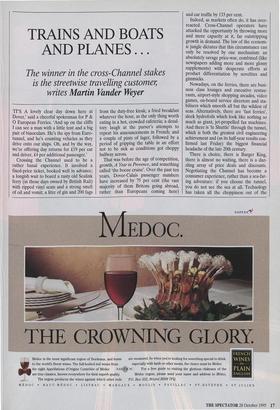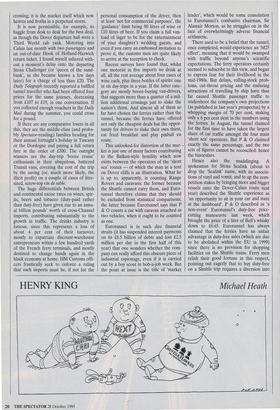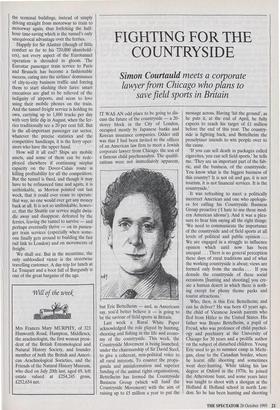TRAINS AND BOATS AND PLANES . . .
The winner in the cross-Channel stakes
is the streetwise travelling customer; writes Martin Vander Weyer `IT'S A lovely clear day down here at Dover,' said a cheerful spokesman for P & 0 European Ferries. 'And up on the cliffs I can see a man with a little tent and a big pair of binoculars. He's the spy from Euro- tunnel, and he's counting vehicles as they drive onto our ships. Oh, and by the way, we're offering day returns for i19 per car and driver, £4 per additional passenger.'
Crossing the Channel used to be a rather banal experience. It involved a fixed-price ticket, booked well in advance; a longish wait to board a rusty old Sealink ferry (in those days owned by British Rail) with ripped vinyl seats and a strong smell of oil and vomit; a litre of gin and 200 fags from the duty-free kiosk; a fried breakfast whatever the hour, as the only thing worth eating in a hot, crowded cafeteria; a desul- tory laugh at the purser's attempts to repeat his announcements in French; and a couple of pints of lager, followed by a period of gripping the table in an effort not to be sick as conditions got choppy halfway across. That was before the age of competition, growth, A Year in Provence, and something called 'the booze cruise'. Over the past ten years, Dover-Calais passenger numbers have increased by 75 per cent (the vast majority of them Britons going abroad, rather than Europeans coming here) and car traffic by 133 per cent.
Indeed, as markets often do, it has over- reacted. Cross-Channel operators have attacked the opportunity by throwing more and more capacity at it, far outstripping growth in demand. The law of the econom- ic jungle dictates that this circumstance can only be resolved by one mechanism: an absolutely savage price-war, combined (like newspapers adding more and more glossy supplements) with desperate efforts at product differentiation by novelties and gimmicks.
Nowadays, on the ferries, there are busi- ness class lounges and executive restau- rants, airport-style shopping arcades, video games, on-board service directors and sta- bilisers which smooth all but the wildest of seas. Alternatively, there are 'fast ferries', sleek hydrofoils which look like nothing so much as giant, jet-propelled fax machines. And there is 'le Shuttle' through the tunnel, which is both the greatest civil engineering achievement and (as its half-year results con- firmed last Friday) the biggest financial headache of the late 20th century.
There is choice, there is Burger King, there is almost no waiting, there is a daz- zling array of price deals and discounts. Negotiating the Channel has become a consumer experience, rather than a sea-far- ing adventure: if you choose the tunnel, you do not see the sea at all. Technology has taken all the choppiness out of the crossing; it is the market itself which now heaves and froths in a perpetual storm.
It is now permissible, for example, to haggle from desk to desk for the best deal, as though the Dover departure hall were a Third World cab rank. Motoring into Calais last month with two passengers and an out-of-date Hook of Holland-Harwich return ticket, I found myself ushered with- out a moment's delay onto the departing Stena Challenger (or 'queen of the sand- bank', as she became known a few days later) for a charge of less than £20. The Daily Telegraph recently reported a baffled tunnel traveller who had been offered four prices for the same journey, decreasing from £107 to £19, in one conversation. If you collected enough vouchers in the Daily Mail during the summer, you could cross for a pound.
If there are any comparative losers in all this, they are the middle-class (and proba- bly Spectator-reading) families heading for their annual fortnight's holiday in Tuscany or the Dordogne and paying a full return fare in the order of £300. The outright winners are the day-trip 'booze cruise' enthusiasts in their ubiquitous, battered Transit vans, covering the cost of the trip by the saving (or, much more likely, the illicit profit) on a couple of cases of litre- sized, screw-top vin de table.
The huge differentials between British and continental excise rates on wines, spir- its, beers and tobacco (duty-paid rather than duty-free) have given rise to an annu- al billion pounds' worth of cross-Channel imports, contributing substantially to the growth in traffic. The drinks industry is furious, since this represents a loss of about 4 per cent of their turnover, mostly to expatriate discount-warehouse entrepreneurs within a few hundred yards of the French ferry terminals, and mostly destined to change hands again in the black economy at home. HM Customs offi- cers frantically seek to enforce a ruling that such imports must be, if not for the personal consumption of the driver, then at least 'not for commercial purposes', the `guidance' limit being 90 Litres of wine or 110 litres of beer. If you claim a full van- load of lager to be for the entertainment of your daughter's wedding guests, and even if you carry an embossed invitation to prove it, the customs men are quite likely to arrive at the reception to check.
Recent surveys have found that, whilst one motorist in five imports no drink at all, all the rest average about four cases of wine each, plus three bottles of spirits: one in six day-trips in a year. If the latter cate- gory are mostly booze-buying van-drivers, that suggests more than a quarter of a mil- lion additional crossings just to slake the nation's thirst. And almost all of them so far have chosen the ferries rather than the tunnel, because the ferries have offered not only the cheapest deals but the oppor- tunity for drivers to slake their own thirst, eat fried breakfast and play pinball en route.
This unlooked-for distortion of the mar- ket is just one of many factors contributing to the Balkan-style hostility which now exists between the operators of the 'short sea' routes — of which the man in a tent on Dover cliffs is an illustration. What he is up to, apparently, is counting Range Rovers and caravans: the former because the Shuttle cannot carry them, and Euro- tunnel therefore claims that they should be excluded from statistical comparisons; the latter because Eurotunnel says that P & 0 counts a car with caravan attached as two vehicles, when it ought to be counted as one.
Eurotunnel is in such dire financial straits (it has suspended interest payments on its £8.5 billion of debts and lost £2.5 million per day in the first half of this year) that one wonders whether the com- pany can really afford this obscure piece of industrial espionage, even if it is carried out by a boy scout in bob-a-job week. But the point at issue is the title of 'market leader', which would be some consolation to Eurotunnel's combative chairman, Sir Alastair Morton, as he struggles on in the face of overwhelmingly adverse financial arithmetic.
There used to be a belief that the tunnel, once completed, would experience an 'M25 effect', meaning that it would be swamped with traffic beyond anyone's scientific expectations. The ferry operators certainly seemed to subscribe to this view, and began to express fear for their livelihood in the mid-1980s. But delays, rolling-stock prob- lems, cut-throat pricing and the enduring attractions of travelling by ship have thus far caused Shuttle passenger traffic to undershoot the company's own projections (as published in last year's prospectus) by a whopping margin of 70 per cent, making only a 6 per cent dent in the numbers using the ferries. In August, the tunnel claimed for the first time to have taken the largest share of car traffic amongst the four main `short sea' operators. But P & 0 claimed exactly the same percentage, and the two sets of figures cannot be reconciled: hence the binoculars.
Hence also the mudslinging. A spokesman for Stena Sealink (about to drop the 'Sealink' name, with its associa- tions of vinyl and vomit, and to up the com- petition stakes by bringing more and bigger vessels onto the Dover-Calais route next year) described the Shuttle experience as `an opportunity to sit in your car and stare at the dashboard'. P & 0 described as 'a non-event' Eurotunnel's duty-free price- cutting manoeuvre last week, which brought the price of a litre of Bell's whisky down to £6.65. Eurotunnel has always claimed that the ferries have an unfair advantage in duty-free sales (which are due to be abolished within the EU in 1999) since there is no provision for shopping facilities on the Shuttle trains. Ferry men relish their good fortune in this respect, pointing out eagerly that to buy duty-free on a Shuttle trip requires a diversion into the terminal buildings, instead of simply driving straight from motorway to train to motorway again, thus forfeiting the half- hour time-saving which is the tunnel's only unequivocal advantage over the ferries.
Happily for Sir Alastair (though of little comfort so far to his 720,000 sharehold- ers), not every aspect of the Eurotunnel operation is shrouded in gloom. The Eurostar passenger train service to Paris and Brussels has become a fashionable success, eating into the airlines' dominance of city-to-city business traffic and forcing them to start slashing their fares: smart executives are glad to be relieved of the indignity of airports, and seem to love using their mobile phones on the train. And the tunnel freight service is holding its own, carrying up to 1,800 trucks per day with very little dip in August, when the fer- ries traditionally see a 20 per cent fall. But in the all-important passenger car sector, whatever the precise statistics and the competitive handicaps, it is the ferry oper- ators who have the upper hand.
How will it all end? Ships are mobile assets, and some of them can be rede- ployed elsewhere if continuing surplus capacity on the Dover-Calais route is killing profitability for all the competitors. But the tunnel is fixed, and though it may have to be refinanced time and again, it is unthinkable, as Morton pointed out last week, that it could ever cease to operate: that way, no one would ever get any money back at all. It is not so unthinkable, howev- er, that the Shuttle car service might dwin- dle away and disappear, defeated by the ferries, leaving the tunnel to survive — and perhaps eventually thrive — on its passen- ger train services (especially when some- one finally gets around to building the fast rail link to London) and on movements of freight. We shall see. But in the meantime, the only unbloodied victor is the streetwise travelling customer. A day-trip for lunch at Le Touquet and a boot full of Burgundy is one of the great bargains of the age.




































































 Previous page
Previous page